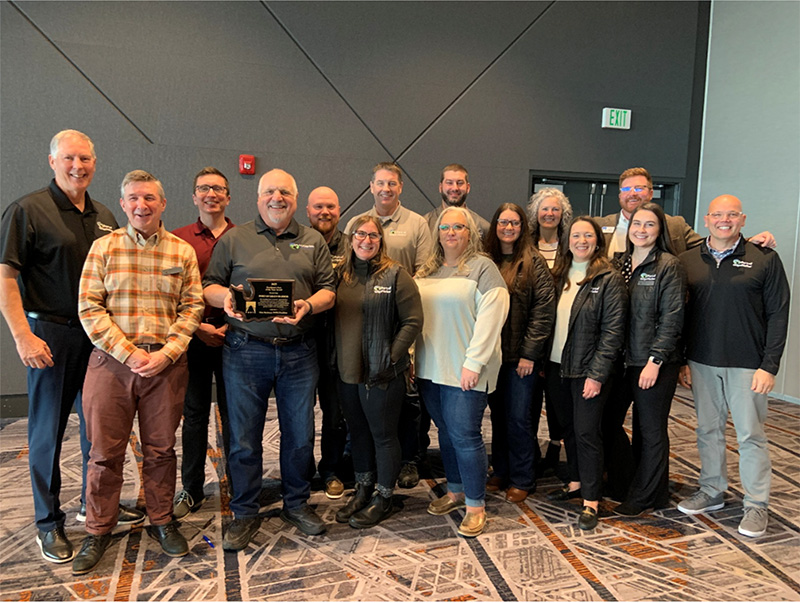By Frank Chmelik and Tim Schermetzler of CSD Attorneys at Law P.S.
Back in March we addressed best practices concerning compliance with the Open Public Meetings Act (“OPMA”). That blog post inspired a discussion at the WPPA Spring conference legal committee meeting about how ports are “noticing” events, other than meetings of the commission, where a majority of commissioners are in attendance, such as WPPA conferences, city or county council meetings, congressional delegations, and business site visits/tours. Following up on the legal committee discussion, this month’s KTW blog post is going to take a deeper dive into this issue and discuss specific nuances in the best practices.
Let’s start with a brief primer on the law. A meeting under the OPMA occurs any time a majority of commissioners take “action”. Said another way, if the port commission takes action, it must do so in a meeting. “Action” is broadly defined in the OPMA and includes any transaction of port business by the commission. This broad definition would include, for example, two commissioners of a three-person elected body attending the same conference and participating in a breakout session discussion. Those commissioners need not make a positive or negative decision involving port business (defined in the OPMA as a “Final Action”)[1] for the gathering to be a meeting under the OPMA. A final action taken in violation of the OPMA is invalid. While it is unlikely that final action would be taken at a conference or similar events, it is important to understand that the OPMA can be violated even where no final action is taken, and commissioners who violate the OPMA are personally liable and could have to pay a civil penalty in the amount of $500 or more for subsequent violations.[2]
When action is taken and a meeting held, the port must fulfill certain procedural requirements under the OPMA. These procedural requirements include providing public notice for the meetings, for regular meetings notice is accomplished through the commission passing a resolution setting.[3] For special meetings, notice must be provided at least 24 hours in advance, delivered to media outlets, posted on the port’s website, displayed at the port offices and meeting site.[4] Most likely, a special meeting notice should be issued if action is taken at the types of events discussed in this blog post. In addition to the requirements for notice, the OPMA requires, taking minutes and record them for public inspection (except for executive sessions),[5] compliance with any remote participation policies adopted by the port[6], and that the meeting be open to the public.[7] In certain instances, it may not be possible to comply with all of these procedural requirements of the OPMA, which would then require the port to consider alternatives that avoid commissioners taking an action.
Along those same lines, a member of the public may allege a violation if they learn about an event attended by a majority of commissioners, even where no action is taken. While we are not aware of any instance where a member of the public made such a claim, and even though such a claim would in all likelihood be dismissed without finding a violation occurred, the port would still have to dedicate resources and spend money to dispel such a claim. For these reasons, we port lawyers who are concerned about unintentional or alleged violations of the OPMA recommend keeping the public informed, and when appropriate noticing a special meeting. Some examples and best practices follow:
-
WPPA Conferences. Is a special meeting notice required when a majority of commissioners often attend WPPA meetings and other conferences? Maybe. These commissioners’ mere attendance, and perhaps even passive receipt of information,[8] at a conference presentation or training may not rise to the level of an “action” under the OPMA. However, if commissioners are participating in discussions, meeting with one another to discuss presentations, meeting with prospective consultants, or any number of other things that could be construed as “action” under the OPMA, those commissioners risk a violation if the notice and procedural requirements of the OPMA are not followed. Best Practices:
-
If a majority of commissioners are merely attending a conference, a port could provide the public with a general notice of attendance of a majority of the commission, but indicate that this is not a public meeting, and no action will be taken. Then, at the next regular meeting of the commission, the commissioners who attended could report on their attendance at the end of the regular meeting of the commission.
-
If there is a possibility of more than mere attendance or passive receipt of information at a conference where a majority commissioners are attending, notice the event as a special meeting and comply with the procedural requirements of the OPMA.
-
Avoid final actions so public comment is not required. The 2022 amendments to the OPMA require a public comment opportunity to be offered at any meeting where the commission takes final action (excluding emergencies).[9]
-
-
City of County Council Meeting. Is a special meeting notice required if a majority of commissioners attend another meeting that is subject to OPMA requirements? Again, maybe. First, it is important to note that separate government agencies’ compliance with the OPMA at a meeting attended by a majority of port commissioner does not relieve the port of also complying with the OPMA. Best Practices:
-
If the city or county council is taking up business at that meeting relating to the port, and a majority of commissioners are present, then action occurred and the port should provide a special meeting notice and comply with the procedural requirements.
-
If a majority of commissioners are attending a council meeting where no port business is being discussed, then a general notice of attendance would suffice. In these instances, commissioners should be cautious to not engage in an unscheduled discussion about port business, as that would be an action under the OPMA and likely amount to a violation.
-
-
Tour of a Business. Is a special meeting notice required when a majority of commissioners attend a tour of a business? Commissioners may tour a business to investigate that industry and viability of bringing that business or similar businesses to the port. Commissioners may tour a business as part of a feasibility investigation before selling or leasing land to a business. In any of these cases, a port would be hard pressed to suggest that a business tour is not an action under the OPMA. Best Practices:
-
If a majority of the commission attends a tour, then the port should issue a special meeting notice and follow the OPMA procedural formalities.
-
Complications may arise for certain business tours where the facility is not open to the public or would require certain conditions to attend. Take for instance, a facility with safety protocols or security clearances that must be adhered to for entrance. These types of conditions would violate the OPMA prohibition on ports imposing requirements or condition precedents on members of the public in order to participate in a meeting.[10] In these cases, the port should arrange separate tours to avoid a violation.
-
-
Congressional Delegation. Ports may send commissioners to Olympia or Washington D.C. to meet with elected officials on port business. If a majority of commissioners attend the same meeting with congress persons, it would constitute an action. Best Practices: the best practices here are the same as for a business tour, avoid sending a majority of commissioners to meet with legislators and their staffers.
OPMA, like other sunshine laws, are about government transparency, disclosure and keeping the public informed about the work of the port. There certainly are examples where there is a clear line that action, as defined in the OPMA, is taken and the port must comply with the notice and procedural requirements of the OPMA. There are, however, instances where the application of the OPMA rules might not be as clear, or where it may appear to a member of the public that a meeting occurred, even though no action was taken, which could still trigger an allegation of a violation from members of the public. We recommend that ports work with their port attorneys to ensure compliance and uphold the intent of the OPMA while keeping the public informed of the business of the port.
A special thank you to the WPPA legal committee chair, Lisa Lowe from Schwabe, for contributing to this month’s KTW blog post. As always, please contact your port counsel with any questions regarding this topic. And, if you have a particular question for a Knowing the Waters, please email us at fchmelik@csdlaw.com or tschermetzler@csdlaw.com
[1] RCW 42.30.020(3)
[2] RCW 42.30.120.
[3] RCW 42.30.070.
[4] RCW 42.30.080(2)(and (3).
[5] RCW 42.30.035.
[6] RCW 42.30.030(2) and any port specific policies adopted concerning remote access for meetings.
[7] RCW 42.30.030(1)
[8] Citizens Alliance v. San Juan County, 184 Wn.2d 428 (2015) (“the passive receipt of e-mails and other one-way forms of communication does not, by itself, amount to participation in a meeting because such passive receipt of information does not demonstrate the necessary intent to meet.”)
[9] RCW 42.30.240.
[10] RCW 42.30.040.





